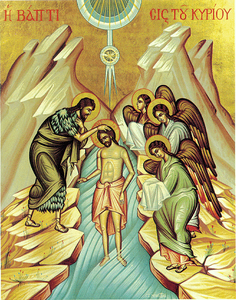The Baptist and the Christ

The Baptist
John the Baptist is an intriguing person. He is the last prophet and he is the first one crying in the New Testament. He is the greatest among those born of women. But he who is least, is greater than he, a sign to Jesus Christ who in the flesh is six months younger than John the Baptist (Matthew 11:11). The son of the priest, but he never practiced his priesthood in the temple. He is the only prophet about whose service prophecies were written (Isaiah 40:3-5; Malachi 3:1; 4:5) due to the importance of his role.
This voice crying in the wilderness had to come before the Christ who does not cry or shout and whom no one in the streets heard him. He is the connection between the Old and New Testament. He was the only prophet who saw the fulfillment of his prophecy of Our Christ. His final task was to witness to the true light. “There was a man sent from God whose name was John. This man came for a witness to bear witness of the light, that all through him might believe” (John 1:6-7). For this reason, his role was not to prepare the minds by explaining old commandments, but to prepare hearts to see the true light and recognize it.
St. Ambrosious says, “Many regard John the Baptist as a symbol to the law, it can rebuke sin, but not forgive it."
Continue reading…Christ is the Servant to the Circumcision

The feast of circumcision is one of the seven minor feasts for the Master. It comes on the eighth day of the birth of Christ, i.e. Toubah 6th / January 14th.
The rite of circumcision:
St. Luke stated that Baby Jesus was circumcised, according to the Jewish tradition, on the eighth day, and was called by the name of Jesus, as he said, “When the eight days were completed for the circumcision of the Child, His name was called Jesus, the name given by the angel before He was conceived in the womb” (Lk2:21). The Giver of Law, the Lord Christ, accepted to submit Himself to the Law of Moses, and to fulfill it personally by His own will in complete humility. He fulfilled all the rite and duties of the Old Testament, not only His circumcision, according to His divine plan, in perfect humility. Therefore, in the Divine Liturgy, we say to Him, “You fulfilled the Law on my behalf”. Thus, He gave us Himself as great example to imitate, for obeying the divine commandments given to us for our benefit.
Continue reading…Glory, Peace, and Joy
During the whole history of mankind it was the first time the angels praise in an audible and understandable voice for people. This praise is an invitation to glorify God and to declare peace on earth and joy among people. The reason behind this heavenly phenomenon is that God came into our world and became with us “Emmanuel” who means God is with us. This angelical praise declares that the kingdom of the coming Messiah is a kingdom of peace and joy, as Christ came to our world as a king to reign over us. (Jn. 18:36,37) Truly, peace on earth and joy among men depend on glorifying God.
Glory Be to God in the Highest
This glorification by the angels at the birth of Christ proves that the humble submission of God during His incarnation didn’t decrease His glory, but rather, it reveals His great might to make Himself of no reputation (Eph. 2:7). It is the glory of His humility that covered all His divine characters.
The divine glory was revealed many times in the Old Testament through: (a.) His mighty acts, and (b.) revealing His glory.
Continue reading…What is God’s plan for us?

Because we are the children of God, we know with certainty that this pandemic, whether under natural circumstances or man-made, occurred with the permission of God. That is why we will not worry because we are carried on God’s arms. He transforms what is bitter into sweetness, and whatever hardship will not be for the purpose of destruction but for edification.
St. Clement of Alexandria (Dean of the School of Alexandria in the 2nd century) says that saying God is ‘Beneficent' does not only mean that He provides us with many good things, but also transforms, even the evil that afflict us into good things and blessings that we may enjoy. He says that God transformed the evil intentions of Joseph’s brothers towards him into wonderful blessings that Joseph, his brothers, and their father enjoyed. Joseph said to his brothers: “But as for you, you meant evil against me; but God meant it for good, in order to bring it about as it is this day, to save many people alive. Now therefore, do not be afraid; I will provide for you and your little ones. And he comforted them and spoke kindly to them” (Genesis 50:20-21)
It is appropriate for us in our daily lives to trust in God’s providence, His love and care for us that He transforms whatever hardships occur to us (what we call evils) to our good. Whether the love of God who transforms our painful matters, whether they were diabolic war, harassing of the wicked, or diseases such as the Covid-19 pandemic.
During this pandemic, we are confident that all things lead to the benefit of humanity. We gained many good things:
Joining the Psalmist who says: “But I give myself to prayer.” (Psalm 109: 4) by holding on to God by praying for:
Mourning with those who suffer and sharing their feelings
Allowing us to review our ecclesiastic life:
Urging some to repent and confess, as they feel that death has become very close
Many have reconciled with those who were hostile to them
Growing in faith to be trained to have hope without falling into anxiety or despair
This pandemic is for our good to prepare us for the eternal heavenly inheritance.
Continue reading…Sacrifice of Praise
What is praise?
- Praise is the glorification of God, who is worthy of thanksgiving, glorification and praise at all times. “You are holy, enthroned in the praises of Israel” (Ps22:3)
- Praise, according to the biblical terminology, is the chanting of Psalms "Sefra Tahlim / The Book of Praise"
- “Whenever you come together, each of you has a psalm, has a teaching” (1Cor14:26)
- “Speaking to one another in psalms and hymns and spiritual songs, singing and making melody in your heart to the Lord” (Eph5:19)
- Jesus practiced praise with His disciples, “When they sung a hymn (the Hallel), they went out to the Mount of Olives” (Mk14: 26)
- The service of praise must be offered in all of our circumstances i.e. it is not only offered for the status of pleasure, but also for thanksgiving to God, and even at the most severe cases of grief, sorrow and despair ... That is why Sts. Paul and Silas were praising despite their suffering from imprisonment, the darkness of the prison, the pains of the feet stocks, and their torn bodies. “At midnight Paul and Silas were praying and singing hymns to God, and the prisoners were listening to them” (Act16: 25)
- In fact, praise with thanksgiving during suffering or at bad circumstances raises the prayer to the level of obedience and submission, so it becomes a glorification of God and a recognition of the wisdom of His management. It is also considered a faithful service.
- Therefore, All the prayers of the Church are presented in chanting and melody on all occasions, even the sad ones, such as the Holy Week
- The month of Kiahk is distinguished by being a month of praise and fasting, rejoicing for the birth of Christ and His dwelling among us, and indeed in us, and for preparing ourselves for His renewed dwelling in us
- This is the reason that Kiahk ritual differs, with its joyful tones, from the Lent ritual, with its supplicating tones that lead to repentance